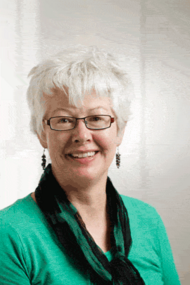INTERVIEW: Jan Gothard

The author of Greater Expectations: Living with Down syndrome in the 21st Century says expectations are fundamental to the way children develop; they shape their future.
This book is partially autobiographical. How has your family’s experience with Down syndrome affected the writing of this book?
It was fundamental to it. Until my daughter Maddie was born, disability was an invisible area to me. Our family’s experience opened my mind to disability and made me aware of what some of the issues are for other individuals and families. The book as a whole is framed around these issues because we’ve lived them. Which is not to say the issues are always the same for every family. This book is based on more than sixty personal interviews for that reason.
Why did you choose the title Greater Expectations?
Expectations are fundamental to the way children develop; they shape their future. This book is premised on a historian’s understanding of how expectations for people with Down syndrome have changed over the course of the last century and into this one. I think the title hints at these changes, and also gives hope for the future.
Your book has been praised by experts in their fields such as Michael Bérubé and Professor Fiona Stanley AC. What does your book add to world literature about disability?
There are lots of ‘how to’ books about disability and also lots of individual parents’ stories. This is not a ‘how to’ book, but it is also broader than the individual experience. It makes disability a wider social issue and represents a whole range of different perspectives on disability without, I hope, telling people ‘this is the right way to go’. This book shows that many paths are possible and that people have to make decisions based on what’s right for them and their families. And that no matter what you think, someone else has been there – you’re not alone. It also charts the enormous advances that have been made in the disability sphere over the past fifty years and encourages people to keep demanding more.
The social and cultural diversity of the people you have interviewed meant their experiences of living with Down syndrome varied. Was there any common thread to all of these experiences?
For all of the people I interviewed the main focus was doing the best thing for their child. It is the person you love; and disability is just another aspect of that person. The families understood their lives are a bit different because of disability, but ultimately, life went on. And they all had an understanding that Down syndrome wasn’t the enormous blow they had thought it would be when their child was first born.
According to the book, the ‘dear little thing’ attitude can be as unhelpful to a child’s integration in a mainstream class as their exclusion. Why?
The ‘dear little thing’ attitude is the patronising pat on the head that says ‘we don’t expect much from you’. It comes back to the question of expectations. If you treat a child as if they can’t, then they won’t. Sitting them in a corner with a teddy all day does not help to prepare them for independence. Not being expected to try really limits a child’s capacity.
You say in the book that the experience of raising a child with Down syndrome has enriched you beyond measure. In what ways?
It’s very hard for me to talk about Maddie without feeling as though I’m gushing! But in general terms, it has exposed me to the world of disability, and that has really changed me. As an academic, I was aware of disability as a dimension of social difference, but it was only when my daughter was born that that world really opened up to me. I think that living with Maddie has taught me to be more patient and tolerant, and to recognise that academic, employment or sporting achievements are no way to measure someone’s worth, if indeed you have to evaluate people at all. When you’re exposed to disability in your own life, suddenly it doesn’t strike you as ‘difference’ anymore – it’s just another part of being human.
Who do you hope will read this book and what do you hope it will achieve?
I hope it will be read by people outside of the Down syndrome community. I think the book will be relevant for people who have experienced living with Down syndrome and with disability more generally, but to me this book is about a larger social question. It is about inclusion, and inclusion is a two-way process. People with disability are fighting for their right to be included, but the rest of society has got to be prepared to open doors. So I hope this book will be read by people who don’t yet think about disability – and make them think about it.


